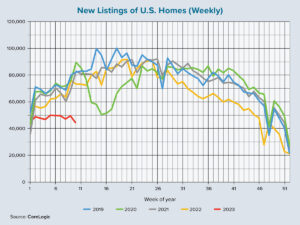Trends in the conventional retail housing market dominate the headlines — and for good reason. Families need homes, and the majority of sales and mortgage transactions happen in the retail market.
But transactions in the consumer housing market are being held back by several factors that people have become familiar with. Inventory remains low by historic standards, buyers need to adjust to interest rates above 5% as the new normal, and sellers need to return to the negotiating table and offer concessions.
The fact is, many consumers are ready to buy and sell, but there is a deficit of at least 5 million homes in the U.S. And while buyers are cautiously waiting to reenter the market, another side of the story is brewing. Single-family home investors are leaning into the market and snatching up opportunities. There are a variety of deals in need of financing that a mortgage originator can take advantage of as investors seek loans in burgeoning markets.
By understanding how current market conditions in the retail housing market are impacting the single-family investor, commercial mortgage brokers can source more leads. A youth movement has created a visible shift in the housing market.
Different playbook
Generation Z and millennial migration patterns have opened up opportunities in the retail and investor housing markets that didn’t exist before. Although affordability is the key driver when purchasing a home, whether the buyer is living in it or renting it out, these younger generations are prioritizing lifestyle and weather when it comes to choosing a location.
Gen Z is expected to make up roughly 30% of the nation’s workforce by 2030 while millennials are continuing to form households and raise families. These two groups are open to living in new cities, including midsized metro areas, that may have been unpopular only a few years ago. They will choose jobs and homes in neighborhoods that meet their budgetary needs or focus on remote work that offers location flexibility.
Younger investors are using a different playbook than the typical 50- to 60-year-old investor. They’re interested in buying properties with the intent to fix them up and rent them out, both as a hedge against inflation and as an opportunity to work for themselves. They’re open to new ideas, looking beyond their own backyard and have a lot of time to experiment with wealth management strategies.
According to a recent New Western survey of nearly 900 real estate investors, 7% of respondents who have already purchased an investment property are 18 to 29 years old. And 15% of the respondents who are looking to invest for the first time in 2023 are in the same age bracket. These buyers will need financing options for both their primary home and investment properties.
This youth movement has contributed significantly to migration and has created affordable investor options in smaller markets. New Western’s survey found that investors under the age of 30 are buying most frequently in midsized metros and college towns that are less expensive, such as Columbus, Ohio; Madison, Wisconsin; Fargo, North Dakota; Missoula, Montana; and Lincoln, Nebraska. And these investors aren’t only relocating and staying in place. They’re buying and holding to rent out a home in more than one location.
Market dynamics
Investors with local expertise are finding deals that didn’t exist before. The frenetic market activity of 2020 and 2021 made it difficult for investors to not only get offers accepted but to even find a property to purchase. With a glut of prospective buyers in the market and sellers expecting offers that exceeded their asking price, investors often stayed on the sidelines because the financial math didn’t make sense.
Soon after, institutional investors (those who own hundreds or thousands of homes) increased their market activity by identifying communities where they could purchase and profit on a large scale. As interest rates rose last year, however, these companies pulled back as they found it difficult to service new debt.
The housing market shifted across the country. Higher mortgage rates led to a retreat among buyers of all types. Companies like Opendoor, Zillow and Offerpad stopped buying homes and, in fact, ended up with inventory they needed to sell — often at a loss. In turn, this opened a new door.
Enter the solopreneur: Mom-and-pop businesses and individual investors walked through this door and began to capture deals. According to New Western’s survey, this trend should continue in the near term as 70% of respondents plan to invest in 2023 while 63% of investors who plan to purchase for the first time felt that interest rates are not too high.
Small investors who leverage their local know-how and nimble operations have a home-field advantage when it comes to finding opportunities in their neighborhoods. They have the skills to take outdated homes in cities across the country and renovate them. If they aren’t planning to hold an asset as a long-term investment, they’ll put it back on the market and provide inventory in undersupplied areas.
Rehab renaissance
When investors buy and rehab these unwanted homes, they resell for 31% less than homes sold via retail in the same market, according to a New Western analysis of Redfin data. Investors have already put more affordable housing options on the market in pandemic-era boom towns like Raleigh, Austin, Nashville and Phoenix by finding homes in need of significant renovations.
Another factor driving the investment-property market is the arrival of the “Great Renovation.” According to the National Association of Home Builders, 75% of U.S. homes were built before 2000 and 35% were built before 1970. In the coming years, even more homes will hit the predictable age in their life cycle when items such as roofs, foundations, plumbing, electrical systems, and heating and cooling systems must be replaced. And that is a point when a homeowner might want to cash in the equity they’ve built over many years rather than put in the time, effort and expense of renovating.
The good news is, there is continued activity in the housing market, regardless of what some mainstream headlines say. Investors are proactively looking for deals and discovering all of the ways they can finance them.
These investors need guidance and information about current loan offerings and strategies. A mortgage broker is a crucial partner at this stage of the investor’s journey, and they can educate novice and veteran investors alike. By providing tools that make clients successful, brokers will develop a relationship that leads to repeat business down the road. ●
Author
-

Kurt Carlton is the president and co-founder of New Western, a nationwide real estate investment company. He oversees the New Western portfolio of companies, including all product, technology, marketing and growth initiatives. Born out of the chaos of the 2008 foreclosure crisis, Carlton co-engineered New Western to consistently stand strong as a pillar of economic promise throughout times of hardship. With a firm emphasis placed on increasing access to opportunity, his career has reflected his values of hard work, integrity and community service.




